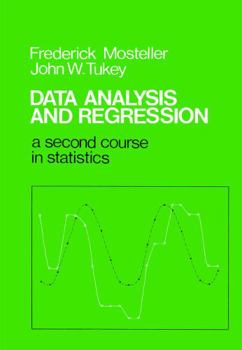Data Analysis and Regression: A Second Course in Statistics
Select Format
Select Condition 
Book Overview
This title is part of the Pearson Modern Classics series. Pearson Modern Classics are acclaimed titles at a value price. Please visit www.pearson.com/statistics-classics-series for a complete list of... This description may be from another edition of this product.
Format:Paperback
Language:English
ISBN:020104854X
ISBN13:9780201048544
Release Date:January 1977
Publisher:Pearson
Length:608 Pages
Weight:2.21 lbs.
Dimensions:1.1" x 6.6" x 9.5"
Customer Reviews
1 rating
An old classic, outdated, but still with remarkable relevance to current practice!
Published by Thriftbooks.com User , 17 years ago
This is an old classic that has become somewhat obsolete because of modern computers. It was written in a time-period where calculations and data analysis were done by hand. There are, however, many aspects of the philosophy and approach to data analysis and statistics communicated in this text that are quite deep, and that are, unfortunately, omitted from many modern texts. In terms of what chapters are still worthwhile, I think chapter 1 is timeless, and chapter 2 is also quite useful (although it will strike many people as alien--and I think this is a testimony to one of the ways in which statistical practice and pedagogy has gone somewhat astray). Chapters 3-6 are more obsolete. The subsequent chapters are mixed, with certain material and methods obsolete, but the general presentation and underlying ideas quite useful. I find the way this book presents regression to make a lot more sense than the way it is presented in more modern books. It is evident from reading this book that the authors actually stop to think about what they're doing and why they are doing it. They have what modern authors would call "skepticism" and what I would simply call common sense. Modern books simply present the most commonly accepted practice along with various diagnostics, in a cookbook fashion. In many respects, I think that this book reflects an earlier era in which things moved at a slower pace and there was more of an emphasis on long-term thinking. Unfortunately, in the modern day-and-age of computers, statisticians have become sloppier than ever before, and this is certainly reflected in textbooks on data analysis and regression. Many are sloppily written and encourage the next generation of statisticians to be equally sloppy. This book will root you in a more disciplined way of doing things. You won't find pages of difficult equations, and you'll find no computer code...but you will find thoughtful prose that will make you think, and that will teach you how to think about your data so that you can ask the right questions and choose the appropriate techniques and interpret them properly. Who should read this book? A better question is, who shouldn't read this book? I only wish I could find a more modern equivalent. As far as I know, there isn't one--and if there is, I certainly have not found it yet.






